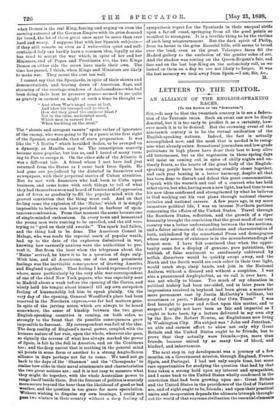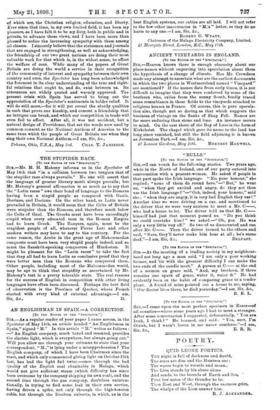LETTERS TO THE EDITOR.
AN ALLIANCE OF THE ENGLISH-SPEAKING RACES.
[TO TIM IEDITOZ OF TER " BPZCTATOV.1
SIR,-It may be that the twentieth century is to see a federa- tion of the Teutonic races. Such an event can now be dimly descried, but it is too early to predict it as a certainty, how- ever much it is to be desired. But the crowning event of the nineteenth century is to be the virtual unification of the English-speaking nations. Indeed, the fact is actually accomplished now, and the most that is needed is to recog- nise what already exists. Sensational journalism and low-grade politicians in high places have done their best to keep alive old bitternesses, but as the vegetation in these spring days will insist on coming out in spite of chilly nights and un- timely frosts, so the hearts of the great body of the English- speaking people have been coming steadily closer together, and each year beating in a better harmony, despite all that has been done to disturb and defeat this great consummation. I speak with the warmth and zeal of a convert who has held other views, but who, having seen a new light, has had time to see his new ideas confirmed and strengthened by what he believes is God working out his vast plans through national charac- teristics and national careers. A few years ago, in my more immature political life, I was an intense Northern partisan concerning the affairs of the United States. Travel through the Southern States, reflection, and the growth of a riper humanity brought the conviction that the great need of our own country was a better understanding between the two sections, and a fairer estimate of the conditions and characteristics of both, unhindered by the sensational Press and demagogues whose only source of existence is in the misunderstandings of honest men. I have felt convinced that when the oppor- tunity came for a display of genuine, pure patriotism, the rubbish of false sentiment so assiduously cultivated by selfish disturbers would be quickly swept away, and the North and the South would see each other in their true light, would catch step, clasp hands, and join in the National Anthem without a discord and without a suspicion. I was also a pronounced Anglophobist, as we call it over here. I was not wholly to blame. Too much of my education in political history had been one-sided, and in later years the impressions received in boyhood had been given a somewhat more permanent cast by Justin McCarthy's brilliant, but sometimes ex parte, "History of Our Own Times." I was first brought to pause and reflect upon this matter, and to suspect I might not have been as fair and impartial as I ought to have been, by a lecture delivered in my own city by the Rev. Dr. Robert Nourse, an Englishman now living in Washington City. His subject was " John and Jonathan," an able and earnest effort to show not only why Great Britain and the United States ought to be friends, but to prove that they actually were friends,—yes, more than friends, because united by so many ties of blood, and kindred, and inheritances.
The next step in my development was a journey of a few months, on a Government mission, through England, France, Spain, and Portugal. I had not only ample time, but some rare opportunities for studying the question that had by that time taken a strong hold upon my interest and sympathies, and I came back to the United States wholly confirmed in the conviction that had been growing upon me : Great Britain and the United States in the providence of the God of Nations are, and of right ought to be, friends ; and upon their practical union and co-operation depends the ultimate triumph through- out the world of that supreme civilisation the essential elements
of which are, the Christian religion, education, and liberty. Ever since that time, in my own limited field, it has been my pleasure, as I have felt it to be my duty, both in public and in private, to advance these views, and I have been more than pleased to notice the increasing sympathy with them among all classes. I sincerely believe that the statesmen and journals that are engaged in strengthening, as well as acknowledging, the friendship of our two great nations are doing their most valuable work for that which is, in the widest sense, to affect the welfare of man. While many of the papers of Great Britain are doing the world a service in their recognition of the community of interest and sympathy between their own country and ours, the Spectator has long been acknowledged the foremost in its clear understanding of the true and right- ful relations that ought to, and do, exist between us. Its utterances are widely quoted and warmly approved. The present crisis with Spain has served to bring out the appreciation of the Spectator's sentiments in bolder relief. It will do still more,—for it will yet reveal the sturdy qualities in each that prove our kinship, and cement a friendship that no intrigue can break, and which our competition in trade will even fail to affect. After all, it was not accident, but a natural design of Providence, that set the words now used by common consent as the National Anthem of America to the same tune which the people of Great Britain use when they sing their own National Anthem.—I am, Sir, &c., Urbana, Ohio, U.S.A., May 3rd. CHAS. T. JAMIESON.



































 Previous page
Previous page